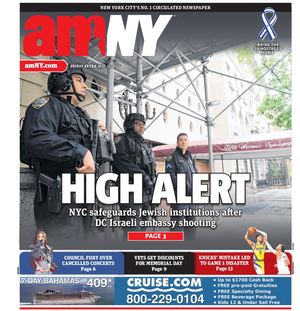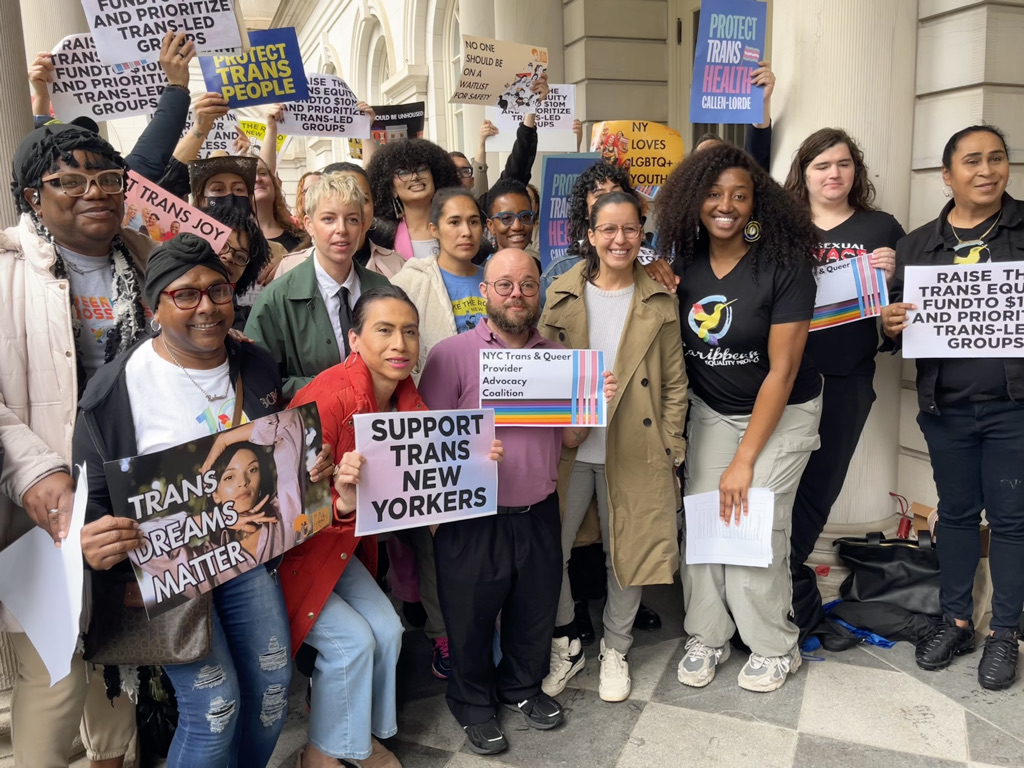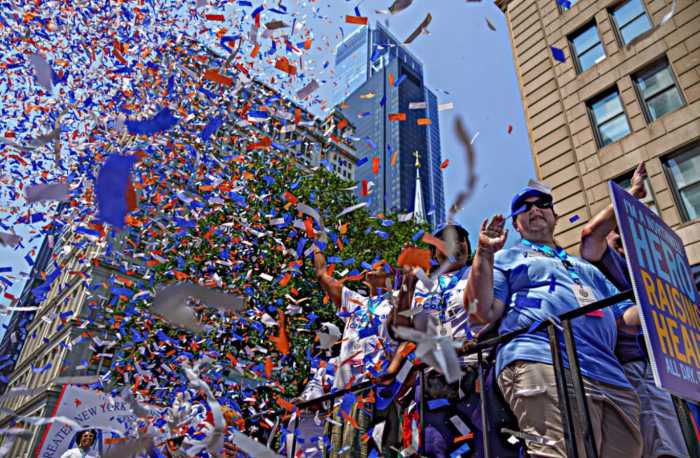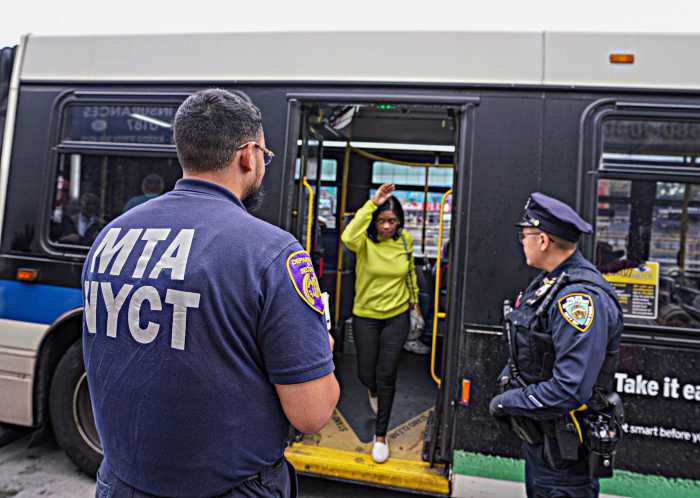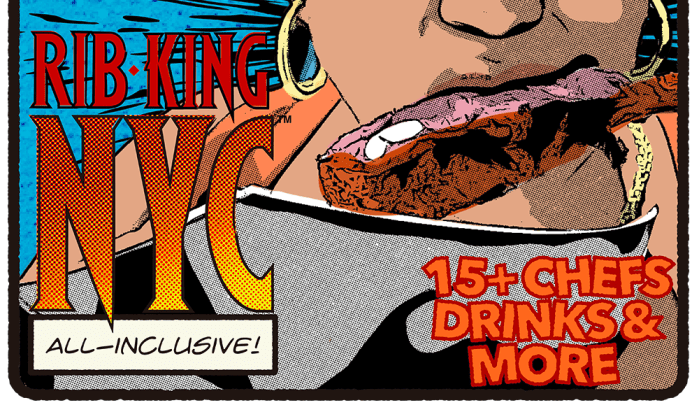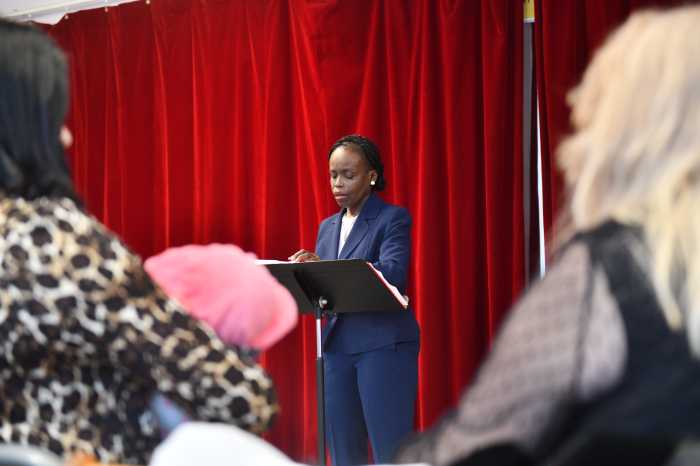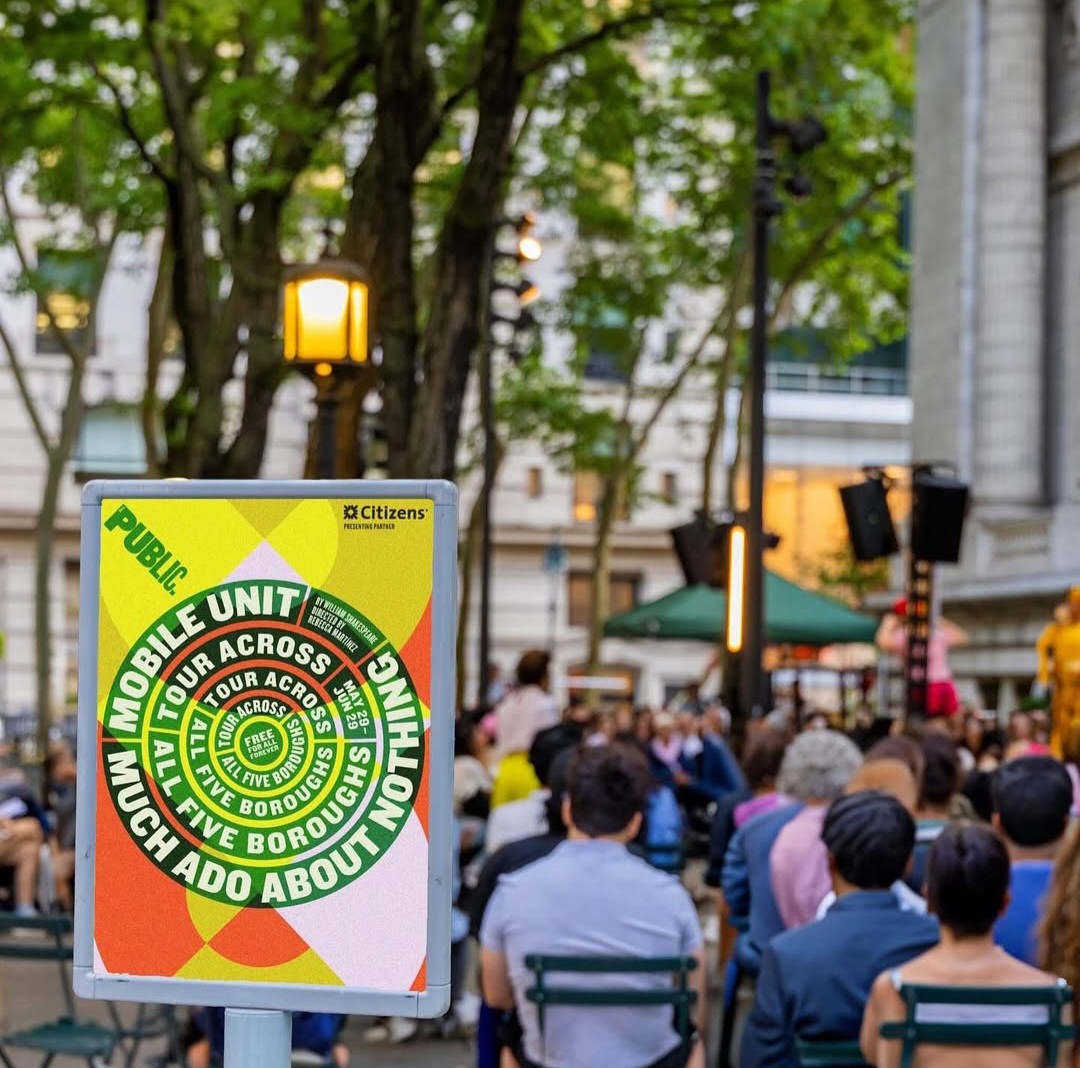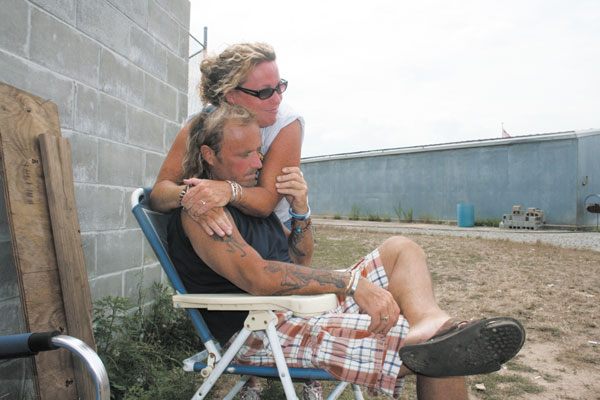
BY ALINE REYNOLDS | John Devlin, 50, was a healthy, athletic engineer who never smoked. In 2009, however, after toiling at Ground Zero following 9/11, he developed a disease often associated with a longtime chain smoker: throat cancer.
The cause of his cancer, though not yet scientifically proven, seems painfully obvious to Devlin and scores of others who like him got sick from breathing in the toxic soup of chemicals at Ground Zero.
As an operating engineer, Devlin worked in the pit 12 hours a day, seven days a week for nine-and-a-half months, shoveling wreckage into carts and hauling it to the west side piers.
“When I got down there on the 12th, it was like snowing debris. I remember as clear as day saying, ‘We’re taking years off our lives being down there,’” recalled Devlin, as he used the inhaler he now depends on to breathe normally due to emphysema.
Devlin used to make six figures before his premature retirement in 2004, when a foot accident, coupled with his respiratory problems from 9/11, prevented him from working. Now, he receives a total of $3,100 a month in New York State Workers’ Compensation benefits and social security, and is struggling make ends meet.
“I don’t need a lot. I just need enough to pay my bills and be able to look at that word, ‘future,’” said Devlin last Thursday while in Brooklyn watching his fiancée’s son play baseball. The couple has five children between them.
“If he’s compensated for cancer, then we can have a future,” interjected Devlin’s fiancée, Nancy Nyhuis, a nurse at Mercy Hospital. “I’ve become the primary caregiver, and it’s very difficult. I’d like the financial burden lifted to the point so that I don’t have to worry if I can buy groceries next week.”
On July 26, Devlin, Nancy and other cancer-stricken 9/11 survivors and their families were distraught after hearing the news that cancer would not be added to the list of illnesses covered by the James Zadroga 9/11 Health and Compensation Act.
Current medical and scientific evidence doesn’t yet justify federally-subsidized treatment or compensation of 9/11 victims for any type of cancer, according to Dr. John Howard, the bill’s health administrator and the director of the National Institute for Occupational Safety and Health, the federal agency overseeing the World Trade Center Health Programs.
N.I.O.S.H.’s decision, Howard emphasized in a statement, is only temporary until the agency reviews a new set of peer-reviewed cancer studies next year.
“Although a determination cannot be made to propose a rule to add cancer, or a type of cancer, to the list of W.T.C.-related health conditions at this time,” Howard stated, “it is important to point out that the current absence of published scientific and medical findings demonstrating a causal association between the exposures resulting from the Sept. 11, 2001, terrorist attacks… does not indicate evidence of the absence of a causal association.”
Of the 294 articles addressing environmental and occupational exposures resulting from the Sept. 11 attack, only 18 of them reference cancer, according to the N.I.O.S.H. report, and none of them contain quantitative data that proves the disease is a direct health outcome of chemical exposures at Ground Zero.
While there is proof of 9/11 victims’ exposure to carcinogens known to cause lung cancer, skin cancer and other forms of the illness, according to the report, it’s unclear exactly how much of the chemicals, and which ones, the victims were exposed to.
“We don’t know what was actually in the air… it wasn’t a controlled study, it was dealing with chaos,” said Jacqueline Moline, former director of the World Trade Center Medical Monitoring and Treatment Program based at Mount Sinai Medical Center. Moline now runs the Queens W.T.C. Clinical Center of Excellence.
The government-sponsored medical monitoring and treatment facilities, Moline noted, were never designed to be research clinics. “They were designed to provide medical examinations and take care of people or refer people to care,” she said.
Moline’s 2009 study, one of the few publications cited in N.I.O.S.H.’s report that mentioned cancer, revealed an unusual number of myeloma cases in individuals under the age of 45. The findings, however, were not enough to convince N.I.O.S.H to include myeloma in its list of treatable illnesses this time around.
“A case report can never provide enough evidence by itself that there’s a causal relationship,” explained Moline. “What it does say is there’s a possible association, and that it’s something we need to look at and examine further going forward.”
N.I.O.S.H. will conduct its next periodic review of cancer in early-to-mid 2012, according to Howard. But U.S. Senator Kirsten Gillibrand and other elected officials contend that’s not soon enough, and are pleading with N.I.O.S.H. to review the cancer studies as they’re published.
A study conducted by the Fire Department of New York, due to come out in late August, might very well contain enough evidence to persuade N.I.O.S.H. to add certain cancers to the bill, according to Moline. The W.T.C. Health Registry will be coming out with its own analysis in the coming months once it completes comparisons between the rate of cancer diagnoses among its enrollees and the cancer rate among the general population in New York State. Moline encourages victims to report their cancers and other illnesses to the W.T.C. health registry to help quicken the pace of the study.
“I am troubled that you do not plan to do another review until early to mid-2012,” Gillibrand said in a July 26 letter to Dr. Howard. “Responders and their families continue to suffer physically and financially from these deadly cancers, and the longer they have to wait on a cancer determination, the longer our 9/11 heroes will continue to suffer without proper treatment or compensation.”
In excluding cancer patients from the benefits granted by the Zadroga Act, “the federal government turns its back on people who rushed to the nation’s aid during one of the darkest days in our history,” echoed District One Councilmember Margaret Chin in a written statement.
Remaining hopeful
John Feal, founder and head of the FealGood Foundation, said he is hopeful these forthcoming publications will prompt N.I.O.S.H. to reverse its decision before the end of the year. “I’m confident that the next review will come up in September or October, and that it’ll benefit us,” he said. “There won’t be a year wait. I can tell you that.”
“It’s real frustrating. You don’t want to sit in the hospital five days at a time, staring at the ceiling, thinking — especially when there’s no hope on the horizon,” said recovery worker Mark Dajewski, who was told just last month that his stage three lung cancer had progressed to stage four.
Dajewski was forced to retire from construction engineering last spring shortly after being diagnosed with the disease. While his former company, C&S Mechanical Co., covers his medical expenses, Dajewski still accumulates hundreds of dollars in co-pays each month that he’s forced to pay out of pocket. Yet, like Devlin, Dajewski is not entitled to federal compensation.
“The disturbing thing about it is, you’re adding salt to an open wound that hasn’t closed in 10 years… for those who are sick and suffering from cancer, it’s painful [emotionally],” said Feal.
Fifty-one out of the 53 first responders and recovery workers whose funerals he has attended, Feal said, died of cancer. “The ironic thing is, the more people that die gives us validity.”
The issue of treating and compensating for cancer, Feal said, is as much of a funding problem as it is an evidence gap. “I don’t think there’s enough money to compensate or provide health care to everybody that has cancer in the bill,” he said. “We’ll have to go back in three years, [close to the time the bill is due to expire,] and ask for more.”
As he watched Nyhuis’ son on the baseball field, Devlin said he was disgusted by N.I.O.S.H.’s decision. In spring 2009, he was diagnosed with stage four throat cancer, and was given a life expectancy of six months.
Had the W.T.C. monitoring program been able to diagnose and treat Devlin for cancer, it might not have progressed to stage four, Nyhuis said. “In March of that year, the monitoring center said he was fine,” she said. “If you’re going to monitor someone, you have to be a little more diligent. If they had gotten the throat cancer at stage one or two, he wouldn’t be in the situation he was in today.”
Devlin’s current oncologist at Stony Brook University Medical Center, Dr. Roger Keresztes, said his time at Ground Zero could have triggered the disease — but so could have a virus or excessive alcohol use.
“Determining the causality of any cancer is difficult if not impossible,” said Keresztes. “I focus more on the treatment than on the cause. He’s had an excellent response to treatment, and I hope it lasts.”
Two years later, Devlin is still alive, with the cancer now undetectable. But he is plagued with recurring pneumonia and living on what he calls “borrowed time.”
“I know I’m standing here watching the ball game, but the reality is, I’ve had 33 radiations, eight [Chemotherapy treatments], numerous throat operations to even get to where I am today,” said Devlin. “There’s no real life here anymore.”
Swallowing food, Devlin explained, is as much of a chore as it is a health risk, since his epiglottis (a piece cartilage in the throat) has shrunk and hardened from the radiation treatment. Every time he eats or drinks, Devlin injects bacteria into his lungs, leading his doctors to consider having him use a feeding tube. They predict that a severe bout of pneumonia could be what ultimately kills him.
Devlin hopes to be alive to marry Nancy next summer. As he looks toward the future, though, he thinks more about fellow survivors than himself, vowing to fight until his death for their treatment and compensation rights.
On the days he feels too sick to leave his house in Brightwaters, Long Island, Devlin spends his time working on a memoir chronicling his battle with cancer and the hurdles the 9/11 community has faced in securing the Zadroga Act’s passage and getting amendments added to the bill.
“I want to make sure that, when my [9/11] brothers and sisters get sick, they have things in place for them,” said Devlin. “If I can make it easier for the next person, I’ll feel a little better about my plight.”
